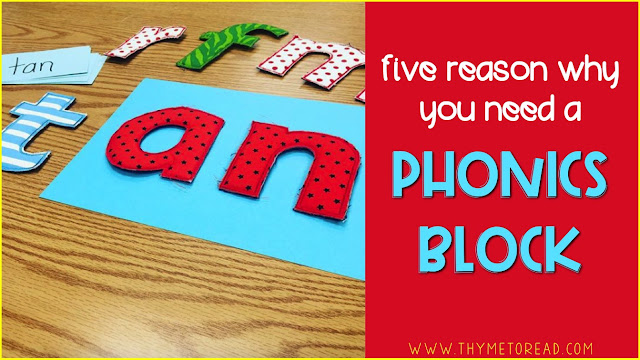My school has recently started a "reboot" of phonics professional development, and increased instruction. We have discussed what we are currently doing, and why it is not quite enough. We have decided to be responsive to our students' needs by implementing a consistent phonics block - a time for explicit, high quality instruction that will support all of our learners, and help them to become more proficient readers and writers. We saw a gap, and something tells me that my school isn't the only one, that is seeing this need. So, why is a phonics block so important?
1. High quality instruction
A phonics block IS the time to pull out research bases strategies that support all learners. It is a time to be flexible and responsive to our students needs. This means teaching and re-teaching phonics skills/spelling patterns as needed so our students have automatic retrieval in reading and writing. It is a time to provide our students with controlled texts that contain the spelling/sound patterns they have already learned.A phonics block is NOT time consuming and difficult to plan for. We all know that we are tight on time (both with our students, and during our planning period). The good news is that our phonics block can be pretty much the same each week, with small tweaks to keep it fresh and engaging for our students.
2. Sacred time for consistent exposure
We know that incremental exposure (the mixing of new concepts and not yet mastered concepts with a few fully mastered concepts) is a great strategy to use with sight words, math facts, vocabulary, etc. and it is the perfect strategy to use with phonics as well. In less than 10 minutes a day (maybe a little longer on the day we are first introducing a new concept), we can work in spiral review of previously learned skills to keep them current, and build more automaticity. We can also provide new teaching (introduction of a new spelling pattern) in a way that allows the brain to focus on the learning rather than the method. Meaning, by being consistent week to week, our students know what to expect from our phonics routine and can focus all of their brain power on learning the new content, rather than focusing on directions.3. Phonics = Fluency = Comprehension
When applied phonics knowledge become automatic, it leads to improved reading fluency. Our fluent readers are also more successful with their comprehension of texts, because the brain can move from learning to read, to reading to learn. This does not mean that phonics instruction trumps or takes the place of fluency and/or comprehension instruction. It just means that one skill is helping the development of the others, and together, they can propel our students along their reading journey a little faster.4. Support the readers who struggle
As with anything, some students may only need minimum exposure/instruction to make connections between phonetic patterns, and the associated sound. However, plenty of our students need repeated exposure and explicit instruction of spelling patterns/rules to make sense of these reading and writing building blocks. For our students who take to reading and writing like it is common sense, we can use this time push them forward and discuss multi-syllable words. For the majority of our students, we need to be aware that there is no natural connection between groups of letters and their sounds. It is our job to assign sounds to groups of letters and bring forth meaning with words. We also cannot assume that our students will master phonics by JUST reading more and practicing spelling.5. Spelling does not equal phonics
Unfortunately, packaged reading programs (typically) lack in the area of phonics. It is often marketed as an included "spelling curriculum". Well, I'm sorry to say providing students with a weekly spelling list, and a set of homework pages is not the same as teaching phonics and spelling patterns. This kind of TEACHING follows a strategic, systematic, building block approach that cannot be outlined in a series. When a series assigns a weekly (get it, and forget it) spelling list, they are missing the structured lessons that introduce students to spelling/sound relationships, thus unlocking the countless words that can be read/written with that pattern.Just some food for thought:
Are we limiting our students to 20 words that fit the pattern of the week?
Are we limiting our students to single syllable words when they should be learning how to read and write multi-syllable words? (Which is good for all students, not just our high performers.)
Are we limiting our students by assessing their spelling ability on a once a week test, rather than authentically and regularly assessing how they apply skills they have learned in their reading and writing?
So, by teaching spelling, are we limiting our students, and cutting their instruction short? ... Which in turn, could have a big (negative) impact on their ability to read and write?
This is a topic that I have been sitting on for quite a while. I think it's because it is controversial to challenge what so many people are doing - and I'm a very non confrontational person. I'm NOT saying that teachers have got it all wrong by not having a phonics block, or by following a spelling curriculum from a reading series. I AM hoping to challenge the norm a little, and provide some points to think about. The key is to provide all of our students with explicit and thorough phonics instruction that will lead them to reading and writing success.
PIN FOR LATER:
Before you go, check out these related phonics posts:
Together everyone accomplishes more!

























0 comments:
Post a Comment